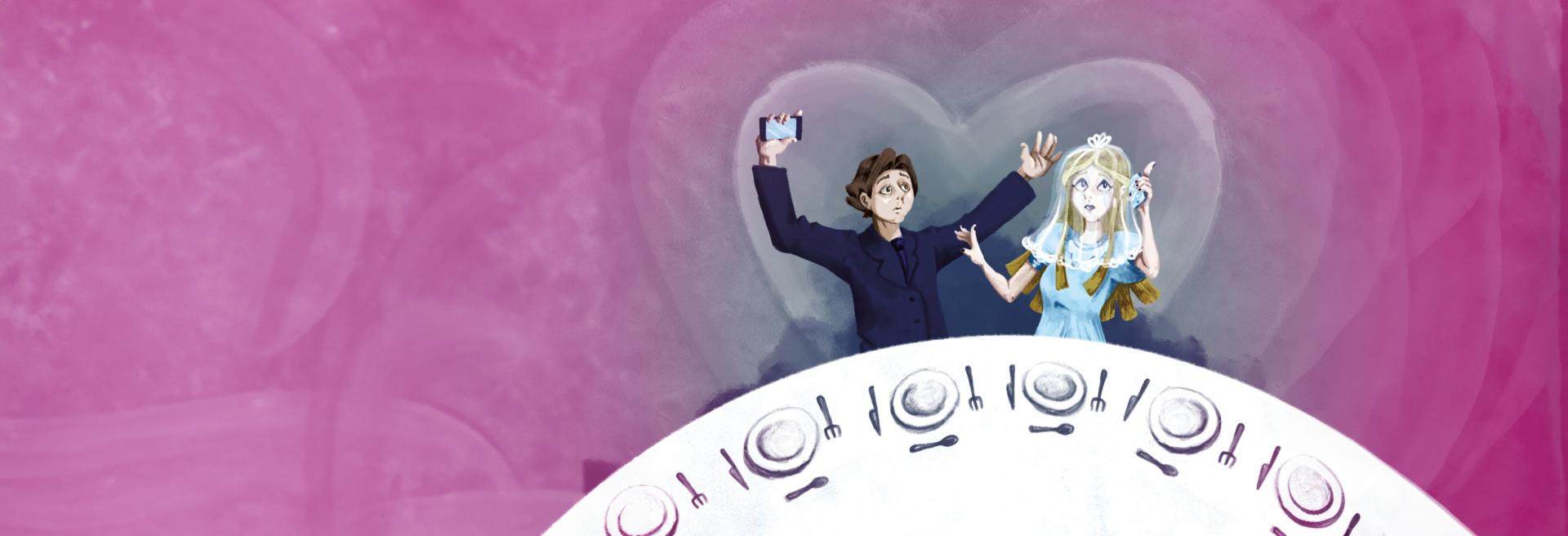Bastien Und Bastienne, The Telephone
Mo | Tu | We | Th | Fr | Sa | Su |
BASTIEN UND BASTIENNE / THE TELEPHONE – MVM Piccolo Programme
One-act operas in Hungarian, with Hungarian subtitles
Performance length: 1 hour 40 minutes, with 1 intermission.
Wolfgang Amadeus Mozart
Bastien und Bastienne
Wolfgang Amadeus Mozart was barely 12 years old when he composed his bucolic little opera, Bastien et Bastienne, which was performed at an “alternative location”, in the garden of a certain Doctor Mesmer whose studies of magnetism are referred to with such comical effect towards the end of Mozart's career as an opera composer, namely, in Così fan tutte. According to the sources, the young Wolfgang wrote Colas's wizard aria in gibberish himself (“Diggi, daggi, schurri, murri...”), and in the overture we can discover a real curiosity: the main theme is practically the same main theme in the first movement of Beethoven's Eroica composed much later…
Bastien is now presented to young audiences as a love story with a bit of magic, at a truly alternative location: on the front stage of Opera House auditorium, on the raised platform of the orchestra pit – under Károly Lotz's famous ceiling fresco.
Gian Carlo Menotti
The Telephone
When it premiered in 1947, Menotti’s one-act opera was a funny jab at the modern world. But today it is a tragicomic view of a symptom of our modern world: mobile communication has redefined our world and has given new meaning to the piece. Our production places the story in the business of a modern big city and tells the story of not just two people, but the generation that lives its life over the phone, in emails, and on social media platforms while slowly forgetting to look into other people’s eyes. Chamber opera with contemporary physical theatrical elements and (maybe) a happy end.
András Almási-Tóth’s production is adapted for young audiences by Andrea Valkai.
Program and cast
Bastien Und Bastienne
General cast
Conductor: Dárius Teremi
Bastien: Gergely Halász univ.stud., Lőrinc Kósa
Bastienne: Zsuzsanna Kapi, Gabriella Rea Fenyvesi
Colas: Boldizsár Zajkás, Aron Ottó Jóhannsson
The Telephone
General cast
Conductor: Dárius Teremi
Lucy: Zsuzsanna Kapi, Gabriella Rea Fenyvesi
Ben: Gergely Halász univ.stud., Lőrinc Kósa
Telephone: Gergely Dargó
Hungarian State Opera
STANDING ROOM TICKETS - INFORMATION IN CASE OF A FULL HOUSE!
If all the seats are sold out for the selected time, but you still want to see the production on that day, 84 of the extremely affordable standing seats will be sold at the theatre, 2 hours before the start of the performance, with which you can visit the gallery on the 3rd floor. Tickets can be purchased at the ticket office of the Budapest Opera House. We would like to draw your attention to the fact that the stage can only be seen to a limited extent from the standing places and the side seats, but at the same time, following the performance is also supported by television broadcasting on the spot.
The Opera House is not only one of the most significant art relic of Budapest, but the symbol of the Hungarian operatic tradition of more than three hundred years as well. The long-awaited moment in Hungarian opera life arrived on September 27, 1884, when, in the presence of Franz Joseph I. the Opera House was opened amid great pomp and ceremony. The event, however, erupted into a small scandal - the curious crowd broke into the entrance hall and overran the security guards in order to catch a glimpse of the splendid Palace on Sugar út. Designed by Mikós Ybl, a major figure of 19th century Hungarian architecture, the construction lived up to the highest expectations. Ornamentation included paintings and sculptures by leading figures of Hungarian art of the time: Károly Lotz, Bertalan Székely, Mór Than and Alajos Stróbl. The great bronze chandelier from Mainz and the stage machinery moda by the Asphaleia company of Vienna were both considered as cutting-edge technology at that time.
Many important artists were guests here including Gustav Mahler, the composer who was director in Budapest from 1887 to 1891. He founded the international prestige of the institution, performing Wagner operas as well as Magcagni’ Cavalleria Rusticana. The Hungarian State Opera has always maintained high professional standards, inviting international stars like Renée Fleming, Cecilia Bartoli, Monserrat Caballé, Placido Domingo, Luciano Pavarotti, José Cura, Thomas Hampson and Juan Diego Flórez to perform on its stage. The Hungarian cast include outstanding and renowed artists like Éva Marton, Ilona Tokody, Andrea Rost, Dénes Gulyás, Attila Fekete and Gábor Bretz.

 EN
EN DE
DE IT
IT FR
FR ES
ES RU
RU JP
JP RO
RO
 Seating plan
Seating plan 
